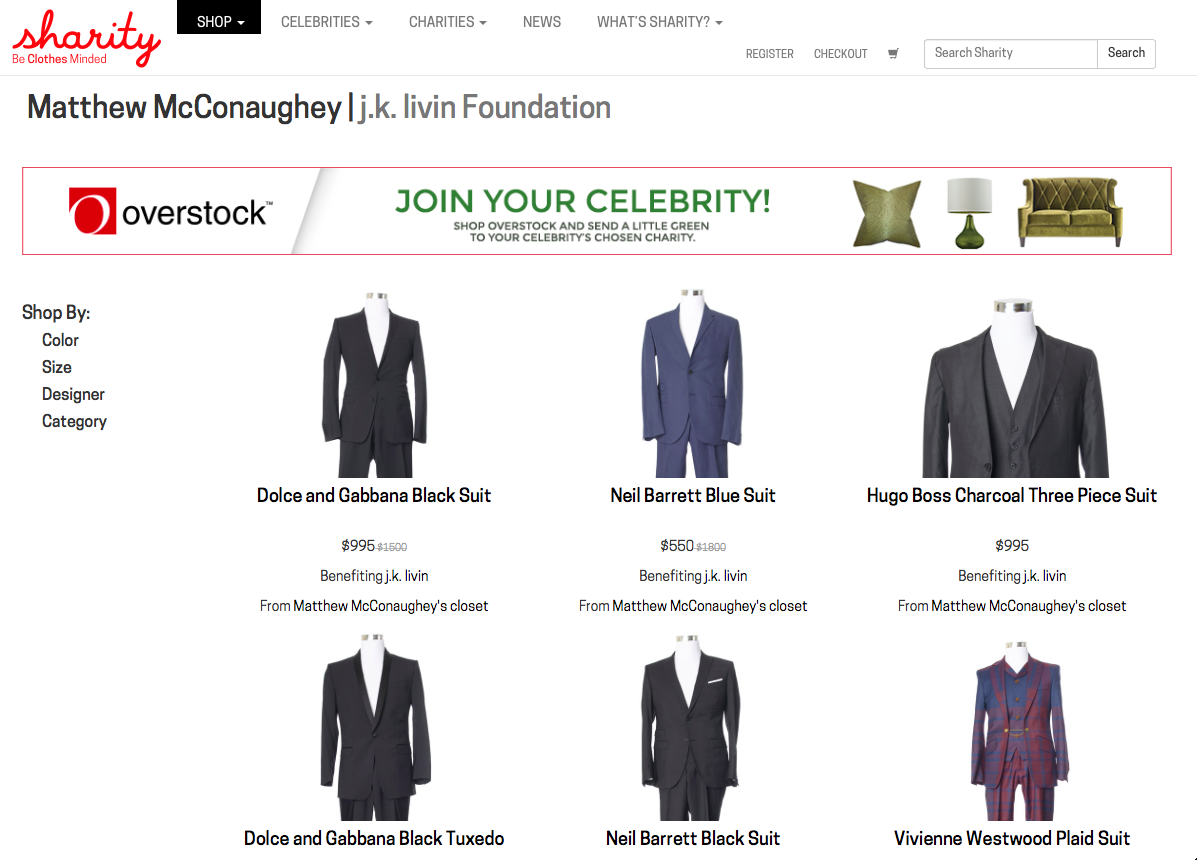 A Q&A with Sharity co-founders Lisa Ginsberg and Jamal Brown. The Los Angeles-based non-profit, which sells clothes from celebrities’ closets on consignment and donates proceeds to a charity of that celebrity’s choice, launched to the public out of beta at the start of November. It was founded earlier this year.
A Q&A with Sharity co-founders Lisa Ginsberg and Jamal Brown. The Los Angeles-based non-profit, which sells clothes from celebrities’ closets on consignment and donates proceeds to a charity of that celebrity’s choice, launched to the public out of beta at the start of November. It was founded earlier this year.
SUB: Please describe Sharity and your primary innovation.
Ginsberg: Philanthropic celebrities, stylists, and fashion icons donate items from their personal closet to sell on sharity.org, where we market and sell them for charity. Sharity gives 100 percent—yes every single penny—to the celebrity, stylist, or fashion icon’s charity of choice. We make this fun, exciting, and most of all personal—giving the celebrity a chance to tell us why their cause is so important to them.
SUB: Who are your target users?
Brown: Women and men ages 18-to-55 that are fashion-minded.
SUB: Who do you consider to be your competition, and what differentiates Sharity from the competition?
Brown: We hate to use the word ‘competition’ as there is a large market for our type of organization, and in the end it’s for charity.
What makes Sharity different—we don’t take a penny of the money raised from sales. For example, when you buy one of Matthew McConaughey’s suits, every single penny goes to his organization, the Just Keep Livin Foundation.
SUB: You just launched to the public. Why was now the right time to launch?
Ginsberg: We launched in beta this past summer with a closet from Sharon Stone. In our first month alone we raised over $15,000 for her charity YaLa –Young Leaders. This experience was invaluable. We learned so much that we applied to our official launch this month.
SUB: Do you have plans to seek outside funding in the near future?
Ginsberg: We are now working on a growth strategy to take Sharity to the next level and have begun discussions with some high-profile potential partners.
SUB: What was the inspiration behind the idea for Sharity? Was there an ‘aha’ moment, or was the idea more gradual in developing?
Brown: I think all businesses develop gradually.
One day Lisa and I were talking about how we could merge our two greatest passions—fashion and philanthropy. We recognized this fashion-focused opportunity to expand the scope of not only our charitable giving, but those of others. Then, after months of brainstorming, we came up with the idea to create Sharity, a new online retail and auction platform that is advertising-driven instead of commission-based.
SUB: What were the first steps you took in establishing the company?
Brown: We sought outside help. It was important to us to find the right people that share not only the mission and vision, but also the passion. It has been a wonderful experience, as each partner has so much they are bringing to the table, pulling from their own experiences.
SUB: How did you come up with the name? What is the story or meaning behind it?
Brown: We are lucky enough to have an incredible board of directors, including Stormy Simon, who is president of the online retailing giant Overstock.com, and Joe Sciarrotta, who is the chief creative officer at Ogilvy & Mather in Chicago.
With that kind of power and support, we were in good hands during some major decision-making. Joe recommended some fantastic creative people to work with and they more than helped with our branding and name. As soon as we heard the name, our vision became reality. Merging the words ‘sharing’ and ‘charity’ perfectly captures the essence of Sharity, while also letting us expand the brand into other directions in the future.
SUB: What have the most significant challenges been so far to building the company?
Ginsberg: Most of the challenges we faced are that of any startup—capital efficiency, identifying our market, drawing upon our business model, securing our management team, and being sure of the product we are putting out there.
For us, it was very important to listen when we needed to listen—especially after our beta launch. Though there is a market and demand for our product, we didn’t realize how large a role social media would play in driving awareness to our site. Some celebrities have a huge social media presence while others none at all, thus our business model changed to reflect these trial-and-errors. After the beta launch, we spent a lot of time and effort putting the right team in place. So much of what a startup does is experimenting, including hiring and firing. We made some expensive mistakes along the way, but I wouldn’t say we wasted it because we learned a lot in the process, and Sharity wouldn’t be where we are today without taking that journey.
SUB: How do you generate revenue?
Brown: Currently, Sharity.org has an advertising-based revenue model for costs, which may change down the line depending on what we do or with whom we partner.
SUB: What are your goals for Sharity over the next year or so?
Ginsberg: To raise awareness and much-needed funds for our charity partners. We are looking at many exciting ways to grow Sharity that keep sharing and charity at our core.











